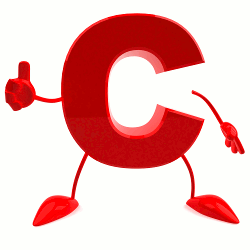The Complete List of
English Spelling Rules
Lesson 13: I Before E Except After C
In this series of lessons, you will learn useful spelling rules in English.
This lesson talks about an important spelling guideline in English. There is a rhyme to help you remember it: "I before E, except after C."

Download a free worksheet + answer key.
This rhyme is a useful guideline to help you remember when to use the vowel combination ie and when to use ei. However, it is only a guideline and not a strict rule.
In fact, there are some longer versions of the rhyme to help you remember the exceptions.
We will start with some common words that follow the guideline.
1. IE: long E sound

The thief stole lots of money!
Click Here for Step-by-Step Rules, Stories and Exercises to Practice All English Tenses
In general, when there is an ie combination after a letter other than c, the i will come first.
However, it is important to remember that these letters can be pronounced in different ways. This guideline really applies especially when the ie combination is pronounced with a long E sound.
Here are some common words with an ie combination and a long E pronunciation:
- believe
- fierce
- achieve
- piece
- chief
- belief
- priest
- countries
- brief
- collie
Here are some common words with an ie combination pronounced with a long E sound after the letter c:
- ceiling
- deceive
- receipt
- perceive
- receive
- conceited
It is also important to remember that whenever you must add -s or add -ed to words that end in y, you need to change the y to an ie. In these cases, you will often see an ie combination after a letter other than c at the end of a word.
In these cases, these vowels are usually pronounced with a long E sound, according to the rule.
2. IE: other sounds

John, Eric, and Amy are friends.
You will find many words in English that have an ie combination after a letter other than c, though they will not have a long E sound. For these words, you should learn the pronunciation of each individually.
Here are some common examples:
- die
- tie
- flies
- funnier
- client
3. IE exceptions: after C

Do you want to be a scientist when you grow up?
There are some common words that have an ie combination after the letter c in the middle of the word. These are exceptions to the rule, and you should memorize them:
- science
- efficient
- species
- sufficient
4. EI exceptions: long A Sound

Penny likes to talk to her neighbor, Angela.
This guideline does not apply to words in which the ei combination is pronounced with a long A sound. In these words, even if there is not a c before the vowels, the e will come before the i.
Here are some common words in which the ei combination is pronounced with a long A sound:
- weigh
- vein
- beige
- eight
- veil
- reign
5. EI exceptions: long E sound

Coffee contains a chemical called caffeine, which gives you energy.
There are a few words in English that contain an ei combination that is pronounced like a long E, after a letter other than c. Of course, this goes against the "I before E except after C" rule that applies to this sound.
In fact, some people say the rhyme as:
"I before E, except after C, and except for in weird words like neighbor and weigh."
The last part refers to the long A sound discussed above (neighbor and weigh), and the word weird is an example of a very common exception to the rule. It has a long E sound, but contains an ei combination after a letter other than c.
Here are some more common exceptions with an ei combination pronounced like a long E after a letter other than c:
- seize
- weird
- protein
- either
- neither
The last two words, either and neither, are pronounced differently in different countries. In the United States, the ei combination has a long E sound, so they are important exceptions to the rule here.
Review
So, let's review what we have learned about ei and ie combinations in
English words:- The "I before E except after C" guideline applies to words
in which the ie combination has a long E sound.
- You will see an ie
after the letter c
at the end of words and in a few important exceptions.
- When the ei
combination is pronounced like a long A, it will be used after letters
other than c.
- "I before E except after C" is only a guideline, not a strict rule. There are exceptions!
Download a free
worksheet
Get Updates, Special Offers, and English Resources
Download your FREE GIFT (the first two chapters of
English Short Stories Book and Workbook)
as soon as you join!

By submitting your email, you consent to receiving updates and newsletters from us and to the sharing of your personal data with third parties for the purposes of sending you communications. We will not spam you. You can unsubscribe at any time. For more information, please see our privacy policy.





